| Listing 1 - 10 of 12 | << page >> |
Sort by
|
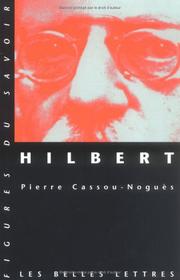
ISBN: 2251760369 9782251760360 Year: 2001 Volume: 29 Publisher: Paris Belles Lettres
Abstract | Keywords | Export | Availability | Bookmark
 Loading...
Loading...Choose an application
- Reference Manager
- EndNote
- RefWorks (Direct export to RefWorks)
David Hilbert (1862-1943) est l’un de ces géants dont la figure domine l’histoire des mathématiques et marque le seuil d’une époque nouvelle. Il parcourt et transforme toutes les mathématiques, portant attention non plus à la nature des objets, la nature de l’espace en géométrie ou celle du nombre en arithmétique, mais à la structure des domaines. Ainsi, s’ouvre l’époque abstraite où, en France, grandira, par exemple, le groupe Bourbaki. Hilbert a indiqué des problèmes et des voies que les mathématiciens continuent d’explorer. Ses recherches ont donné appui à de nouvelles disciplines hors des mathématiques, comme la mécanique quantique ou l’informatique, et trouvé un écho inattendu hors des sciences exactes, dans la linguistique et la psychanalyse lacanienne. Avant tout, l’œuvre de Hilbert est le développement de la méthode abstraite qui caractérise les mathématiques modernes. Cette méthode, Hilbert l’applique dans tous les domaines mathématiques et, finalement, la pousse jusqu’à ses limites pour donner un fondement, une garantie dernière à la science. Le programme de fondement, que l’on a appelé le programme formaliste, donne lieu aux théorèmes d’incomplétude, qu’établit Gödel en 1931, et aux machines de Turing. Nous suivons cette aventure, de l’émergence de la méthode abstraite jusqu’au programme formaliste et aux résultats de Gödel et de Turing. Nous tentons d’en dégager la portée philosophique. Sont en jeu le statut de l’infini, l’extension et les caractères de la pensée humaine.
Mathematicians --- Hilbert, David, --- Gilʹbert, D., --- Hilbert, D. --- 希爾伯特, --- Mathematicians - Germany - Biography.
Book
ISBN: 9780521514378 9780511642098 9780521183895 9780511639050 0511639058 9780511641497 0511641494 9780511636608 0511636601 0521183898 0511642091 0521514371 1107190142 1282386417 0511640811 9786612386411 0511637985 0511640137 9781107190146 9781282386419 9780511640810 661238641X 9780511637988 9780511640131 Year: 2009 Publisher: Cambridge Cambridge university press
Abstract | Keywords | Export | Availability | Bookmark
 Loading...
Loading...Choose an application
- Reference Manager
- EndNote
- RefWorks (Direct export to RefWorks)
Most scholars think of David Hilbert's program as the most demanding and ideologically motivated attempt to provide a foundation for mathematics, and because they see technical obstacles in the way of realizing the program's goals, they regard it as a failure. Against this view, Curtis Franks argues that Hilbert's deepest and most central insight was that mathematical techniques and practices do not need grounding in any philosophical principles. He weaves together an original historical account, philosophical analysis, and his own development of the meta-mathematics of weak systems of arithmetic to show that the true philosophical significance of Hilbert's program is that it makes the autonomy of mathematics evident. The result is a vision of the early history of modern logic that highlights the rich interaction between its conceptual problems and technical development.
Theory of knowledge --- Hilbert, David --- Mathematics --- Mathématiques --- Philosophy. --- Philosophie --- Hilbert, David, --- Logic of mathematics --- Mathematics, Logic of --- Gilʹbert, D., --- Hilbert, D. --- 希爾伯特, --- Philosophy --- Arts and Humanities
Book
ISBN: 9780195372229 9780199707157 0195372220 0199707154 Year: 2013 Publisher: New York, N.Y. Oxford University Press
Abstract | Keywords | Export | Availability | Bookmark
 Loading...
Loading...Choose an application
- Reference Manager
- EndNote
- RefWorks (Direct export to RefWorks)
David Hilbert was one of the great mathematicians who expounded the centrality of their subject in human thought. In this collection of essays, Wilfried Sieg frames Hilbert's foundational work, from 1890 to 1939, in a comprehensive way and integrates it with modern proof theoretic investigations. Ten essays are devoted to the analysis of classical as well as modern proof theory; three papers on the mathematical roots of Hilbert's work precede the analytical core, and three final essays exploit an open philosophical horizon for reflection on the nature of mathematics in the 21st century.
Mathematical logic --- Philosophy of science --- Hilbert, David --- Mathematics --- Mathématiques --- Philosophy. --- Philosophie --- Hilbert, David, --- Philosophie. --- Logic of mathematics --- Mathematics, Logic of --- Gilʹbert, D., --- Hilbert, D. --- 希爾伯特, --- Mathématiques
Book
Abstract | Keywords | Export | Availability | Bookmark
 Loading...
Loading...Choose an application
- Reference Manager
- EndNote
- RefWorks (Direct export to RefWorks)
Mathematics --- Minkowski, H. --- Hilbert, David --- Mathematicians --- Correspondence, reminiscences, etc --- Hilbert, David, --- Scientists --- Gilʹbert, D., --- Hilbert, D. --- 希爾伯特, --- Minkowski, Hermann, --- Minkovskiĭ, German, --- Hilbert, David. --- Minkowski, Hermann
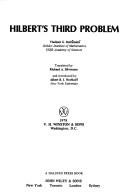
ISBN: 0470262893 Year: 1978 Publisher: Washington (D.C.): Winston
Abstract | Keywords | Export | Availability | Bookmark
 Loading...
Loading...Choose an application
- Reference Manager
- EndNote
- RefWorks (Direct export to RefWorks)
Geometry --- 514.11 --- Tetrahedra --- Geometry, Solid --- Polyhedra --- Elementary geometry, trigonometry, polygonometry --- Hilbert, David --- Tetrahedra. --- Hilbert, David, --- 514.11 Elementary geometry, trigonometry, polygonometry --- Gilʹbert, D., --- Hilbert, D. --- 希爾伯特, --- Géometrie combinatoire
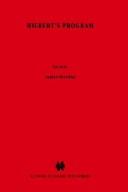
ISBN: 9027721513 9789027721518 9048184207 9401577315 Year: 1986 Volume: 182 Publisher: Dordrecht Reidel
Abstract | Keywords | Export | Availability | Bookmark
 Loading...
Loading...Choose an application
- Reference Manager
- EndNote
- RefWorks (Direct export to RefWorks)
Mathematics --- Mathématiques --- Philosophy. --- Philosophie --- Hilbert, David, --- Philosophy --- -Math --- Science --- Hilbert, David --- -Philosophy --- Mathématiques --- Wiskunde. Filosofie. --- Hilbert (David). --- Mathématiques. Philosophie. --- Logic of mathematics --- Mathematics, Logic of --- Gilʹbert, D., --- Hilbert, D. --- 希爾伯特, --- Mathematics - Philosophy --- Hilbert, David, - 1862-1943
Book
ISSN: 11474920 ISBN: 2711616061 9782711616060 Year: 2004 Publisher: Paris Vrin
Abstract | Keywords | Export | Availability | Bookmark
 Loading...
Loading...Choose an application
- Reference Manager
- EndNote
- RefWorks (Direct export to RefWorks)
Hilbert, David, --- Existence theorems --- Mathematics --- Logic of mathematics --- Mathematics, Logic of --- Philosophy --- Gilʹbert, D., --- Hilbert, D. --- 希爾伯特, --- Differential equations --- Mathematical physics --- Hilbert, David, - 1862-1943. --- Hilbert, David, 1862-1943
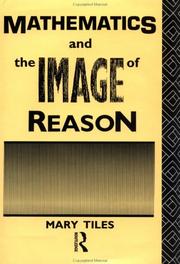
ISBN: 1134967721 1280539259 9786610539253 0203028368 0203327063 9780203327067 9780203028360 0415033187 9780415033183 9781134967728 9781134967674 9781134967711 9780415755221 1134967713 Year: 2015 Publisher: London Routledge
Abstract | Keywords | Export | Availability | Bookmark
 Loading...
Loading...Choose an application
- Reference Manager
- EndNote
- RefWorks (Direct export to RefWorks)
A thorough account of the philosophy of mathematics. In a cogent account the author argues against the view that mathematics is solely logic.
Mathematics --- Logic of mathematics --- Mathematics, Logic of --- Philosophy. --- Frege, Gottlob, --- Russell, Bertrand, --- Hilbert, David, --- Gilʹbert, D., --- Hilbert, D. --- 希爾伯特, --- Frege, G. --- Fu-lei-ko, --- Frege, Friedrich Gottlob, --- פרגה, גוטלוב, --- Frege, Friedrich Ludwig Gottlob, --- Philosophy --- Russell, Bertrand --- Philosophy of science --- Logic
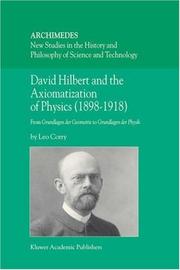
ISBN: 140202777X 9048167191 1402027788 Year: 2004 Publisher: Dordrecht Springer
Abstract | Keywords | Export | Availability | Bookmark
 Loading...
Loading...Choose an application
- Reference Manager
- EndNote
- RefWorks (Direct export to RefWorks)
David Hilbert (1862-1943) was the most influential mathematician of the early twentieth century and, together with Henri Poincaré, the last mathematical universalist. His main known areas of research and influence were in pure mathematics (algebra, number theory, geometry, integral equations and analysis, logic and foundations), but he was also known to have some interest in physical topics. The latter, however, was traditionally conceived as comprising only sporadic incursions into a scientific domain which was essentially foreign to his mainstream of activity and in which he only made scattered, if important, contributions. Based on an extensive use of mainly unpublished archival sources, the present book presents a totally fresh and comprehensive picture of Hilbert’s intense, original, well-informed, and highly influential involvement with physics, that spanned his entire career and that constituted a truly main focus of interest in his scientific horizon. His program for axiomatizing physical theories provides the connecting link with his research in more purely mathematical fields, especially geometry, and a unifying point of view from which to understand his physical activities in general. In particular, the now famous dialogue and interaction between Hilbert and Einstein, leading to the formulation in 1915 of the generally covariant field-equations of gravitation, is adequately explored here within the natural context of Hilbert’s overall scientific world-view. This book will be of interest to historians of physics and of mathematics, to historically-minded physicists and mathematicians, and to philosophers of science.
Mathematicians --- Mathématiciens --- Axioma's. --- Mathematische fysica. --- Hilbert, David, --- Gilʹbert, D., --- Hilbert, D. --- 希爾伯特, --- Physics. --- Mathematics. --- History. --- Philosophy and science. --- History and Philosophical Foundations of Physics. --- History of Mathematical Sciences. --- Mathematical Methods in Physics. --- Philosophy of Science. --- Science and philosophy --- Science --- Annals --- Auxiliary sciences of history --- Math --- Natural philosophy --- Philosophy, Natural --- Physical sciences --- Dynamics
Book
ISBN: 9789042030909 Year: 2010 Volume: 98 Publisher: Amsterdam Rodopi
Abstract | Keywords | Export | Availability | Bookmark
 Loading...
Loading...Choose an application
- Reference Manager
- EndNote
- RefWorks (Direct export to RefWorks)
Mathematics --- Logic --- Logic, Symbolic and mathematical. --- Philosophy. --- Philosophy --- History --- History. --- Cantor, Georg, --- Hilbert, David, --- Hoene-Wroński, Józef Maria, --- Logic, Symbolic and mathematical --- Math --- Science --- Logic of mathematics --- Mathematics, Logic of --- Algebra of logic --- Logic, Universal --- Mathematical logic --- Symbolic and mathematical logic --- Symbolic logic --- Algebra, Abstract --- Metamathematics --- Set theory --- Syllogism --- Hoene-Wroński, Józef Maria, --- Wroński, Józef Maria Hoene-, --- Gilʹbert, D., --- Hilbert, D. --- 希爾伯特, --- Mathématiques --- Logique --- Fondements --- Philosophie
| Listing 1 - 10 of 12 | << page >> |
Sort by
|

 Search
Search Feedback
Feedback About UniCat
About UniCat  Help
Help News
News